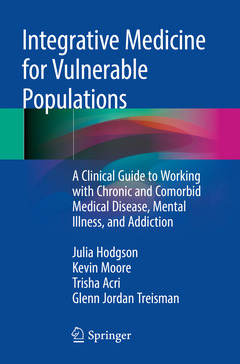Description
Integrative Medicine for Vulnerable Populations, 1st ed. 2020
A Clinical Guide to Working with Chronic and Comorbid Medical Disease, Mental Illness, and Addiction
Authors: Hodgson Julia, Moore Kevin, Acri Trisha, Treisman Glenn Jordan
Language: English
Subjects for Integrative Medicine for Vulnerable Populations:
58.01 €
In Print (Delivery period: 15 days).
Add to cartSupport: Print on demand
Description
/li>Contents
/li>Biography
/li>Comment
/li>
This first-of-its-kind title addresses the failures of an often fragmented healthcare system in managing vulnerable patients with multiple, chronic, co-morbid conditions -- patients who are frequently unresponsive to the methods and approaches used to treat other patients with conditions that are less complicated. The book emphasizes a holistic evaluation to patient care that looks at the wholepatient, providing comprehensive formulations that describe the interacting problems that afflict the patient, including elements that are barriers to effective treatment of active medical problems and barriers to recovery. The book begins by defining integrated care, discussing the types of patients who benefit from this approach and some of the models of care, including financing, barriers to acceptance, and advocacy for patients. The second section discusses the structural elements of integrated care, including the building of a team approach, issues of leadership, and role definition, as well as the authors? experiences in overcoming some of the problems. In the remaining sections, the book discusses major complicating features of the patients seen in integrative care settings, including a description of the kinds of problems, a model for formulation of patient cases, and successful approaches to treatment of these problems. Finally, some of the real-world applications where integrative care provides better outcomes is covered, including in terms of addictions, medically complex patients, and chronic pain patients. Integrative Medicine for Vulnerable Populations - A Clinical Guide to Working with Chronic and Comorbid Medical Disease, Mental Illness, and Addiction is a major contribution to the clinical literature and will be of great interest to health care professionals, administrators, policy stakeholders, and even interested patients and patient advocates.
Acknowledgements
Preface
Section One Foundational Concepts of Integrative Medicine
Chapter 1 Fundamental Concepts of Integrative Medicine
Chapter 2 Models of Integrative PracticeChapter 3 Requisite Practices of Integrative Medicine
Section Two Conceptualization and Diagnosis in Integrative Medicine
Chapter 4 Understanding the Disease of Addiction
Chapter 5 The Four Facets of Patient ConceptualizationChapter 6 Diagnostic Decision Making Processes
Section Three Treatment within an Integrative Medicine Model
Chapter 7 Behavioral and Psychological Interventions for Addiction
Chapter 8 Adjunctive Pharmacotherapy for Opioid Addictions
Chapter 9 Applying Integrative Medicine Skills to a Case Example
Section Four Logistical Considerations of Integrative Care
Chapter 10 Setting Up an Integrative Medicine Team
Chapter 11 An Integrative Training Model
Chapter 12 Applying Coordinated Treatment Skills to a Case Example
Chapter 13 Sample Patient Guide to Care
Chapter 14 Conclusion
Julia Hodgson, PsyD, MEd
The Center for Integrative Medicine/AIDS Care Group
Sharon Hill, PA 19079-1411 USA
Kevin Moore, PsyD
Courage Medicine Health Center
Philadelphia, PA, 19038 USA
Trisha Acri, MD MSCE
Courage Medicine Health Center
Philadelphia, PA 19107 USA
Glenn J. Treisman MD, PhD
Eugene Meyer III Professor of Psychiatry and Medicine
Johns Hopkins University School of Medicine
Departments of Psychiatry and Behavioral Sciences and Internal Medicine
Baltimore MD 21287 USA
Comprehensive analysis of managing vulnerable patients with multiple, chronic, co-morbid conditions
Model based on extensive, collected data from patient cases and outcomes
Written by experts in the field




